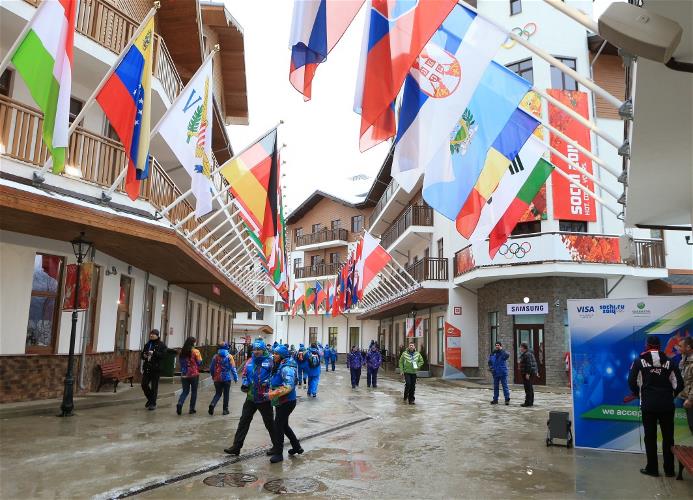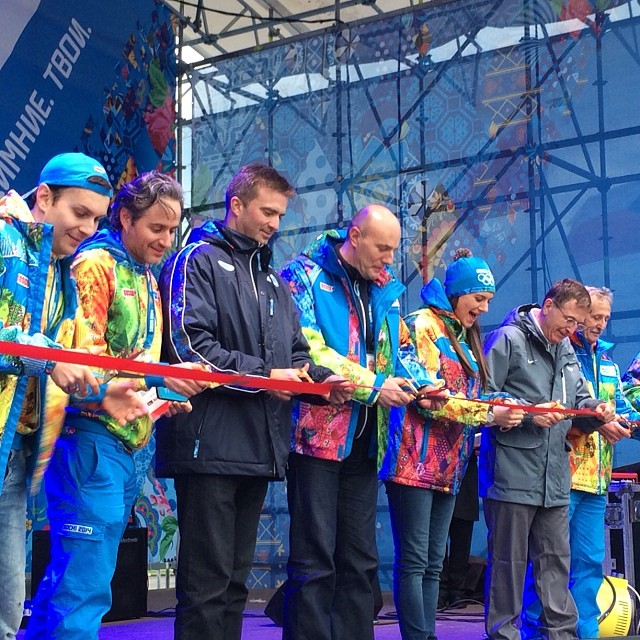Sochi 2014: Olympic villages and people of “Sochi 2014”
A special article of Svetlana Tragesser for Dispatch News Desk (DND)

Sochi, Russia: Villages and Villagers of Sochi, a Black Sea coastal area are waiting to host thousands of foreigners. Sochi has been hosting tourists and visitors in past as Sochi is known for tourism and events but participants are mostly Russians or people from former USSR states. Western people and faces are not very much familiar in this region. Russia the former USSR have been behind iron curtain and even last 2 decades have not changed it much and interaction with foreigners is still limited to big cities. There are three Olympic villages “Sochi 2014” set for guests and the largest of the three villages – “Mountain Village” will accommodate nearly 3,000 people. Additional Olympic Village expects more than 1,000 participants. Philosophy and design of each village was centered around his own style, slogan chosen color schemes and national pattern. Each village will be unique to her souvenirs and crafts, icons, and unique design and architectural art objects that will replenish the treasury of the rich heritage of the Sochi Games. Streets villages will carry the names of famous Olympic and Paralympic champions of Russia and the USSR.
Seaside Village “Manor”
Seaside Village consists of 47 buildings and covers an area of 72 hectares on the shores of the Black Sea in the Imereti Valley.
During the Olympic Winter Games athletes will be staying here, acting in the following sports: ice hockey, curling, figure skating, speed skating and short track.

Coastal Olympic village – a place where generations of tradition meet with the best technology of the modern world. Here perepletetsya past and present – Games organizers decided to show the way to the Palace of Russia’s revival era to the present day. The concept of coastal villages reflected what Russia can rightly be proud of – a classic art (music, ballet), literature, art, science and space. In turn, all the achievements will be presented through the prism of modern technology.
Mountain Village “The Village”
Mountain Olympic village ready to accept almost 3,000 athletes and delegation members.
During the Olympic Winter Games athletes will be staying here, acting in the following sports: skiing, bobsleĭ, fristaĭl, sannyĭ skiing, Nordic combined, skeleton, ski jumping jumping and snowboarding.
In the mountain village is the International Zone, where the athletes will be able to meet with the media, dignitaries and visitors. Connections will be available within the village and from the village to the competition venues, 24 hours a day. In addition, athletes and delegation members will be able to take advantage of two cable car stations Rose Farm, which is located within walking distance of the Mountain Village. This village gives a special touch of Russian traditions of hospitality to guests and offering traditional crafts food, games, fun, songs, signs and arts.
Located in the unique beauty of its mountainous terrain, these mountain villages will offer places where foreigners will have opportunities for listening music and fairy tales of this region. This particular region has many popular Russian folk tales and famous fairy-tale characters like: Baba Yaga, Firebird, Ilya Muromets, Sadko, Ivan the Fool and the Gray Wolf. Such fairy tales characters offer chance to understand personality traits of the Russian people, their humor, morals and values.
Sochi (Russian: Со́чи) is a city in Krasnodar Krai, Russia, located on the Black Sea coast near the border between Georgia/Abkhazia and Russia. The Greater Sochi area, which includes territories and localities subordinated to Sochi proper, has a total area of 3,526 square kilometers (1,361 sq mi) and sprawls for 145 kilometers (90 mi) along the shores of the Black Sea near the Caucasus Mountains. The area of the city proper is 176.77 square kilometers (68.25 sq mi).
According to the 2010 Census, the city had a permanent population of 343,334 up from 328,809 recorded in the 2002 Census, making it Russia’s largest resort city. It is one of the very few places in Russia with a subtropical climate, with warm to hot summers and mild winters.
Sochi is hosting the XXII Olympic Winter Games and XI Paralympic Winter Games in 2014, as well as the Russian Formula 1 Grand Prix from 2014. It is also one of the host cities for the 2018 FIFA World Cup.
Before 1864 Sochi was a little village. In the North, a few hundred Sunni Muslim Shapsugs, a part of the Adyghe nation, lived around Tkhagapsh, near Lazarevskoye. The Adyghe people (also known as Circassians) converted to Islam from Christianity in the 17th century. Currently, Sochi is a large predominantly Christian city where around 30,000 Muslims living including Adyghe, Eastern Caucasians, Turks, Tatars, and other smaller Muslim groups.

There are around thirty Christian Orthodox churches, the largest being St. Michael’s, and two monasteries, plus two Catholic churches, one in the center of Sochi and the other in Lazarevskoye. Sochi is almost unique among larger Russian cities as having some aspects of a subtropical resort. Apart from the scenic Caucasus Mountains, pebble and sand beaches, the city attracts vacation-goers with its subtropical vegetation, numerous parks, monuments, and extravagant Stalinist architecture. About two million people visit Greater Sochi each summer, when the city is home to the annual film festival “Kinotavr”.
Sochi is also known for its sport facilities that make great and notable players as Grand Slam champions Maria Sharapova and Yevgeny Kafelnikov (Kafelnikov spent much of his childhood here, while Sharapova relocated to Florida at the age of seven).
Visitors and residents of each village will find something for everyone. It’s the holidays, performances, concerts, master classes, which will show the present Russian hospitality, without violating the tight schedule of training and competition.
It offers residents all the Olympic Village will be available dining room, clinic, fitness center, multi-religious center, library, bank, cafe, club, shops. All the infrastructure is located within walking distance from the residential area. Connections will be available within the village and from the village to the competition venues, 24 hours a day.
At the Games in Sochi will each village is unique, but within a single concept they are closely related to each other.





